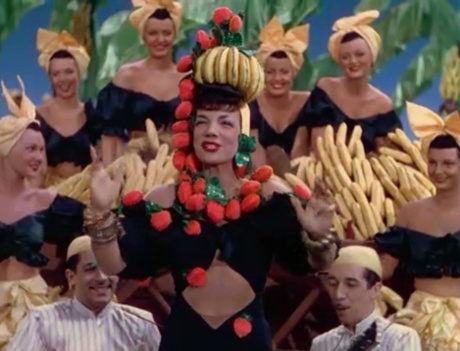
The great choreographer Busby Berkeley (1895-1976) learned his craft as a US army officer orchestrating parades during the first world war and became famous in the 1930s regimenting chorus girls in black-and-white art deco musicals at Warner Brothers. The Gang’s All Here was his first picture in colour, made on loan from conservative MGM to 20th Century Fox, which specialised in conventional, brightly lit Technicolor musicals, usually starring Alice Faye and Don Ameche. His wildest, most delirious picture, it’s a veri“Those who consider Berkeley a master consider this his masterpiece”, Pauline Kael once said.table time capsule of the 1940s.
One of the film’s roles was as a second world war morale-booster. The wispy plot, for instance, centres on a soldier returning from the Pacific front a decorated hero to be reunited with his girl, a New York nightclub singer. A major scene involves a gala to sell war bonds to wealthy socialites. The outlandish Carmen Miranda, the Brazilian Bombshell noted for her outrageous headgear and malapropisms, is there to appeal to Latin American audiences and to embody President Roosevelt’s Good Neighbour policy.
But these are conscience-soothing concessions. The movie provides an escape from wartime anxieties and austerities into an extravagant, fantastical world, most spectacularly in what James Agee called Berkeley’s “paroxysmic production numbers” involving Miranda. The most famous of these is The Lady in the Tutti Frutti Hat, in which chorus girls brandish enormous censor-baiting phallic bananas; the most bizarre is the proto-psychedelic Polka Dot Polka where disembodied heads of the stars spin around the screen.
Though indifferently served by the jokesmiths, the gravel-voiced Eugene Pallette provides familiar comic pomposity as the hero’s rich father, and the outrageously camp Edward Everett Horton gets a laugh with every expert double-take. “King of Swing” Benny Goodman and his orchestra are on hand to represent the big band era, but for me the scene that most brings back my wartime childhood is the lovely Alice Faye, in her last movie, singing the evergreen hit No Love, No Nothin’, a heartbreaking ballad of yearning and separation presented in a realistic, kitchen-sink setting. The romantic lead is played by the bland B-movie western star James Ellison standing in for the unavailable Don Ameche. His dim presence is almost justified by the scene in which Alice Faye says to him: “Stop acting like Don Ameche and get me a taxi.”

